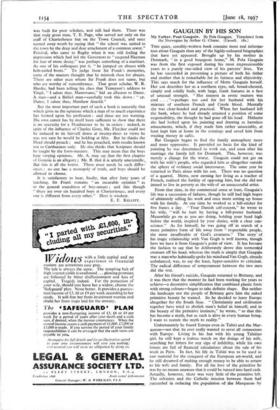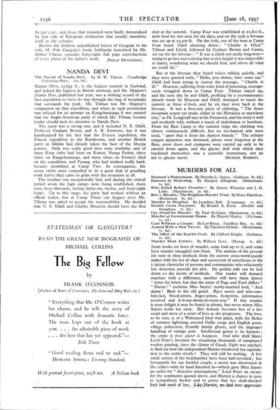GAUGUIN BY HIS SON
Tins quiet, sensibly-written book contains more real infonpa- non about Gauguin than any of the highly-coloured biographies that have yet appeared. Brought up by his mother in Denmark, " in a good bourgeois home," M. Pola Gauguin was from the first exposed during his most impressionable years to a purely one-sided view of his parents' lives. Yet he has succeeded in presenting a picture of both his father and mother that is remarkable for its fairness and objectivity.
This says much for the influence of Mette Gauguin herself.
Her son describes her as a northern type, tall, broad-chested, simply and solidly built, with large, frank features in a face of unusual strength. " Her interest in erotic matters Was cool . . . "—perhaps too cool for her husband with his mixture of southern French and Creole blood. Mentally she was clear-headed and practical. When her husband left the bank, where he had already attained a position of some responsibility, she thought he had gone off his head. Hitherto she had looked upon his painting and drawing as harmless amusements, which, if they made him rather unsociable, at least kept him at home in the evenings and saved him from wasting money in cafés.
But Gauguin began to find the family atmosphere more and more oppressive. It provided no basis for the kind of painting he was determined to work out, and soon after his marriage the family left for Denmark. This, however, was merely a change for the worse. Gauguin could not get on with his wife's people, who regarded him as altogether outside
the sphere of ordinary social intercourse. The same year he returned to Paris alone with his son. There was no question
of a quarrel. Mette, now earning her living as a teacher of French, realised the futility of opposing him, but she did not intend to live in poverty as the wife of an unsuccessful artist.
From that time, in the commercial sense at least, Gauguin's life was a succession of failures, though he still had high hopes
of ultimately selling his work and once more setting up house
with his family. At one time he worked as a bill-sticker for five francs a day. " Your Danish self-esteem," he wrote to his wife, "will. be hurt by having a bill-poster husband.
Meanwhile go on as you are doing, holding your head high before the world, inspired by your duties, with a clear con- science." As for himself, he was going off in search of a more primitive form of life away from " respectable people, the most insufferable of God's creatures." The story of his tragic relationship with Van Gogh is well known, though here we have it from Gauguin's point of view. It has become the fashion to say that he deliberately drove this tormented creature off his head, whereas the truth is simply that Gauguin was a manwho habitually spoke his mindandVan Gogh, already unbalanced, was, to say the least, hyper-sensitive to criticism. The radical difference of temperament between the two men did the rest. • After his friend's suicide, Gauguin returned to Brittany, and it was there that the manner he had been working for years to achieve—a decorative simplification that combined plastic form with strong colours—began to take definite shape. But neither the landscape nor the people of Brittany gave him the naked primitive beauty he wanted. So he decided to leave Europe altogether for the South Seas. " Christianity and civilisation together have tried to abolish man's belief in himself; and in the beauty of the primitive instincts," he wrote, " so that this has become a myth, but as such is alive in every human being. I want to restore the myth to reality."
Unfortunately he found Europe even in Tahiti and the Mar- quesas—not that- he ever really wanted to sever all connexions with Europe. Living in his but with his young Tahitian girl, he still kept a jealous watch on the doings of his wife, searching her letters for any sign of infidelity, while his own letters are full of financial calculations 'about the sale of his work in Paris. In fact, his life in Tahiti was to be used-as raw material for the conquest of the European art-world, and he still dreamed of making enough money to be able to return to his wife and family, For all his love of the primitive- he was by no means unaware that it could be turned into hard cash. Actually, however, there was very little of the primitive left. The colonists and the Catholic mission between them had succeeded in reducing the .population --of the -Marquesas by
8o per cent., and those that remained were badly demoralised by that side of European civilisation that usually manifeits itself in the colonies.
Besides the hitherto unpublished letters of Gauguin to his wife, M. Pola Gauguin's book, brilliantly translated by Mr. Arthur Chaser, contains forty-eight full page reproductions of every phase of his father's work. pinup HENDERsoN:















































 Previous page
Previous page